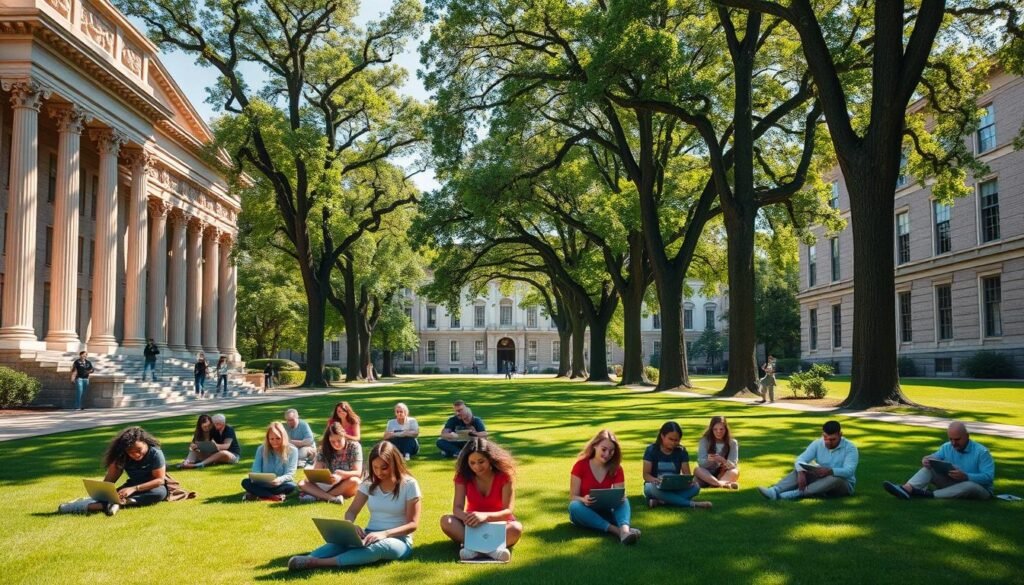
Find International Graduate Scholarships Germany for Your Studies

Fact: most public university tuition is nearly zero, yet living costs in Germany often total about €900–1,100 per month, so funding matters more than you think.
You’ll get a clear starting point with up-to-date information on major awards like DAAD, Erasmus+, Heinrich Böll, Deutschlandstipendium and foundation grants that cover stipends, travel, and health contributions.
This brief intro shows how a targeted scholarship can bridge rent, insurance, and research travel without derailing your study plan.
Learn how to find, apply for, and win top scholarships for 2025–2026 across the US, UK, Canada, and Australia.
Explore Scholarships Guide →Who benefits? Master’s, doctoral, and postdoc students can apply, and you’ll learn which awards fit your level, deadlines, and eligibility so you avoid wasting time on ineligible options.
Expect quick facts on monthly stipends, allowances, and selection cycles. Use this as your action plan to shortlist awards, contact university offices, and schedule strong applications.
- Why Germany is a top choice for affordable graduate study and how scholarships bridge the gap
- Government and organization-funded scholarships you can target next semester
- Scholarships offered by German universities you can apply to directly
- international graduate scholarships Germany: what to expect for eligibility, coverage, and deadlines
- Application requirements you should prepare early
- What funding looks like in practice: stipends, fees, and extra allowances
- Plan your timeline around upcoming semesters and application windows
- Where to find help: international offices, websites, and regional support
- Take your next step toward funding your degree in Germany
Why Germany is a top choice for affordable graduate study and how scholarships bridge the gap
Even with little tuition, you still face living costs and well-targeted aid closes that gap fast.
Public universities offer some of Europe’s most affordable higher education, which lets you focus on your degree without heavy fees. Yet rent, health insurance, books, and travel still add up each month.
Targeted scholarships and financial aid step in to cover recurring needs like rent and insurance and one-off program expenses such as research trips or lab fees. You can find monthly stipends for a full year, short grants for exchanges, or awards tied to specific projects.
- Many awards match merit or need, so align your profile to what funders seek.
- You can often stack university awards with external grants when allowed.
- Timing matters: sync applications with the academic year and program deadlines to avoid last-minute stress.
Knowing what each scholarship covers helps you build a realistic budget and keep your focus on study and research.

Government and organization-funded scholarships you can target next semester
Several major government and foundation programs offer regular stipends, travel support, and health insurance contributions you can target next semester.
Key public and foundation options:
- DAAD - Monthly support (€992 master’s, €1,300 PhD), travel and health insurance contributions; deadlines vary by country.
- Heinrich Böll - Funding for master’s and doctoral students with social engagement; two windows (Mar 1, Sep 1) and varied allowances.
- Deutschlandstipendium - €300 per month via partner universities for at least two semesters; university deadline windows (often Jun–Aug).

Other options include KAS (B2 german language required, master’s €992, PhD €1,400), Erasmus+ exchange grants, Friedrich Ebert support, MSCA postdoc fellowships, StipendiumPlus income‑based aid, and Bayer Foundation project grants.
| Program | Level | Typical support | Deadline note |
|---|---|---|---|
| DAAD | Master’s / PhD | €992–€1,300 per month + travel & insurance | Varies by call |
| Deutschlandstipendium | Bachelor’s / Master’s | €300 per month (2+ semesters) | Set by university (often Jun–Aug) |
| MSCA | Postdoc | 12–24 months living & mobility allowances | Next call opens May 8, 2025 |
Scholarships offered by German universities you can apply to directly
Campus awards often match your degree program or research profile. They can be faster to apply for and give clear requirements and deadlines. Below are four practical examples to target this semester.

Humboldt Research Fellowship
Who: postdoc and experienced researchers.
What: €2,700 per month (postdoc) or €3,200 per month (experienced). Funding runs 6–24 months and covers family, private health, and travel allowances.
Apply: submit CV, research plan, publications, doctoral certificate, language proof, and a host confirmation. Selection meets in March, July, and November.
TUM Linde/MDSI Master Scholarship
For data-focused master students in Data Engineering or Mathematics in Data Science.
Support: €1,000 per month for up to 12 months. Last deadline was Mar 2, 2025; calls appear each semester.
Prepare motivation letter, CV, recommendation, transcripts, and current TUM report for the application.
Heidelberg HAUS Scholarships
U.S. student awards for study abroad: $4,500 (bachelor’s semester) and $7,000 (master’s semester).
Next deadline: June 8, 2025. Check the university website for exact requirements and submission steps.
University of Hamburg Merit Scholarships
Up to €930 per month for students; doctoral researchers may get up to €1,200. Typical funding lasts 12 months with reapplication up to three years.
| Program | Level | Support | Deadline note |
|---|---|---|---|
| Humboldt | Postdoc / Experienced | €2,700–€3,200 per month + allowances | Selection: Mar / Jul / Nov |
| TUM Linde/MDSI | Master’s | €1,000 per month (up to 12 months) | Calls each semester |
| Heidelberg HAUS | Bachelor’s / Master’s (U.S.) | $4,500 / $7,000 per semester | Next: Jun 8, 2025 |
| Univ. of Hamburg | Bachelor’s / Master’s / Doctoral | Up to €930 / doctoral €1,200 per month | 12 months; reapply up to 3 years |
international graduate scholarships Germany: what to expect for eligibility, coverage, and deadlines
Eligibility and coverage vary a lot so map requirements early to save time and avoid surprises.
Eligibility basics
Expect providers to check your prior degree and whether your intended degree program fits their focus. Many calls require a recognized degree and a strong academic record.
Language proof matters: some funders ask for English tests, others require German at B2. For doctoral students, research experience or publications can strengthen your case.
What’s covered
Most awards include a monthly stipend DAAD rates often fall between €992 and €1,300 per month for master and PhD support.
Many also help with health insurance, travel or mobility allowances, and occasional research costs so your study period has fewer gaps.
Deadlines and periods
Selection cycles usually align to the winter semester and other intake periods. Check application deadlines early and note fixed windows like March 1 and September 1 for some foundations.
Rules on stacking awards differ. Translate and certify german academic transcripts ahead of time, and contact prospective supervisors early if you need host confirmation before the deadline.
Application requirements you should prepare early
A smooth application begins long before the portal opens collect, translate, and organize now. Start by mapping each program’s list so you can meet deadlines without stress.
Core documents
Assemble the basics: a completed application form, an up-to-date CV, official transcripts, degree certificates, and language proofs.
Translate and certify documents when the website demands it. Name files consistently so uploads go fast in the final weeks.
Motivation and research
Write a clear motivation statement that links your goals to the funder’s aims.
For doctoral awards, include a focused proposal or exposé with methods, milestones, and expected completion dates.
Recommendations and host confirmations
Line up referees early. Some programs need academic references plus a host confirmation from a German institution.
Share a one-page synopsis and timeline with potential supervisors to speed a positive reply.
Financial need vs. merit
If you claim need, prepare concise evidence and a narrative. For merit-based calls, highlight grades, publications, and awards.
- Use a checklist to compare requirements across calls.
- Run a two-pass review: content first, then formatting and compliance.
- Keep a tracker of submission dates so you can follow up calmly.
What funding looks like in practice: stipends, fees, and extra allowances
Seeing concrete numbers helps you decide whether a funding offer will cover day-to-day life and research costs.
Monthly stipends vary by level and program. Master’s awards often range from €300 to €1,000 per month (for example, Deutschlandstipendium €300 or TUM MDSI €1,000). Doctoral students may see €1,300–€1,550 per month from providers like DAAD or StipendiumPlus.
Postdoc and experienced researcher pay is higher. Humboldt grants can reach €2,700–€3,200 per month and include family, travel, and insurance allowances.
Additional support reduces your out-of-pocket need. Many programs add health insurance contributions, travel or mobility allowances, and childcare. StipendiumPlus and some university merit awards explicitly include insurance and family top-ups.
| Program | Typical per month | Extras | Who |
|---|---|---|---|
| DAAD | €992–€1,300 | Travel & health insurance contributions | Master’s / PhD |
| StipendiumPlus | Students €855; Doctoral €1,550 | Insurance, childcare, research allowances | Students / doctoral students |
| Humboldt | €2,700–€3,200 | Family, insurance, travel support | Postdoc / Experienced |
| Univ. of Hamburg | Up to €930 | Monthly top-up for living costs | Bachelor’s / Master’s / Doctoral |
Map your estimated monthly budget rent, food, transport, and study materials then match each award’s financial support to those lines. Check payment timing, renewal rules, and whether one-off relocation or visa costs are covered during the funded period.
Plan your timeline around upcoming semesters and application windows
Start by mapping fixed university dates and funder calls onto a year-long calendar. Anchor your work to semester cycles so you see which tasks fit the winter semester or the summer intake.
Key windows winter semester intakes, program-specific calls, and university registration
Work backward from each application deadline. Block time for drafts, referee requests, and a final compliance check at least a few weeks before the portal closes.
Expect program-specific calls across the year: MSCA opens May 8, 2025; Bayer runs Feb 14–Apr 11, 2025; Heinrich Böll has Mar 1 and Sep 1 windows.
- Chart each funding period, decision time, and likely start date so overlaps don’t collide.
- Check registration windows early enrollment rules can affect eligibility for some awards.
- Allow extra time for translations, notarizations, and visa appointments before the winter semester rush.
| Call | Typical deadline | Decision / start period | Action |
|---|---|---|---|
| Heinrich Böll | Mar 1 / Sep 1 | Selection within months; start next semester | Choose the window that gives you time for references |
| MSCA | Opens May 8, 2025 | Calls yearly; project start varies | Prepare proposal drafts early in the year |
| Bayer Foundation | Feb 14–Apr 11, 2025 | Decisions within weeks | Set referee requests 4–6 weeks ahead |
| Humboldt | Selections Mar / Jul / Nov | Starts 2–12 months after selection | Map selection dates to your desired start period |
Once accepted, match the scholarship payment schedule against your lease and registration dates so you cover your first month with confidence.
Where to find help: international offices, websites, and regional support
Start locally: your campus has staff who track active awards and can point you to exact forms and deadlines.
Your university’s international office is the fastest route to tailored information on open calls, internal funds, and documentation rules. Visit the office, ask for checklists, and request workshops on proposal writing and budgeting.
University websites and faculty portals act as central hubs for program pages, deadlines, and application forms. Faculty pages often list niche funds, like the Amirana award for Medicine and Dentistry at Heidelberg, that do not appear on national lists.
Regional and city support
Regional bodies such as the Munich Student Union offer housing help, health insurance guidance, and practical financial aid options. They often provide multilingual information that eases early enrollment and visa steps.
| Resource | What they offer | Best contact |
|---|---|---|
| University international office | Application guidance, document checks, workshops | Office desk / booking page |
| Faculty portal | Discipline-specific programs, deadlines, niche funds | Faculty administration |
| Munich Student Union (regional) | Housing, emergency aid, health insurance info | Student services desk |
Tip: keep a running list of contacts and revisit sites each semester. Ask the office about stacking rules and whether german foreign applicants need local enrollment first. This saves time and avoids small compliance errors.
Take your next step toward funding your degree in Germany
Pick a handful of promising calls, then work backward from each application deadline to set weekly milestones.
Start by shortlisting three to five scholarship or fund options that suit your degree program and timeline. Draft a core application, then tailor it to each program’s requirements.
Book language tests, request transcripts, and line up referees now. Check whether your university enrollment or a host invitation is needed for master degree or PhD calls like MSCA (opens May 8, 2025), Bayer (Feb–Apr), Heinrich Böll (Mar/Sept), and Humboldt (Mar/Jul/Nov).
Sanity‑check your budget using typical per month stipends and confirm visa timing for international students. Submit early, keep a simple tracker, and apply to both options if you’re undecided momentum wins.
Looking for Scholarships in 2026?
Explore our complete collection of top scholarships for international students across the USA, UK, Canada, Australia, and Europe.






Leave a Reply